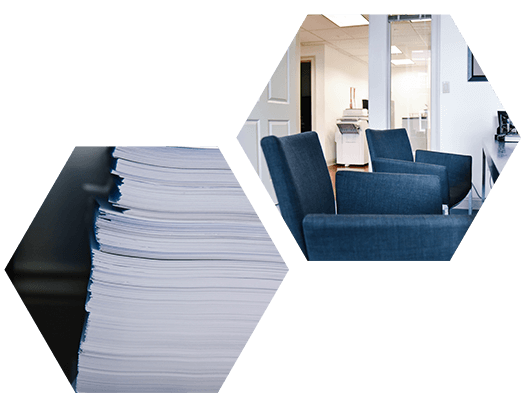Separation
Morris County Legal Separation Attorneys
Helping you find the path forward
Sometimes people need time apart even if they aren’t ready to divorce. In these situations, separated parties can struggle with how to divide responsibilities like financial obligations and child custody.
In some states (like New York), this type of situation is provided for by a process known as legal separation, which is distinct from divorce. Rather than ending a marriage, legal separation establishes a legally enforceable agreement that outlines the rights and responsibilities of both parties within the marriage. It frequently covers subjects like parenting time, responsibility for bills, and how property will be divided and maintained.
Unlike many neighboring states, New Jersey doesn’t offer formalized legal separation, meaning that there’s no legally recognized status for couples who wish to live separately and aren’t yet ready for divorce.
It’s critical that New Jersey residents seeking separation consult an experienced family law attorney. Our attorneys can help you assess your options and identify a path forward that minimizes your legal vulnerabilities.


At Jacobs Berger, we work with people who are separating—but not yet divorcing—to create legal agreements that clarify rights and responsibilities during the separation period.
Seeking the counsel of an experienced and trusted attorney is particularly important when trying to navigate a separation in a state that doesn’t recognize legal separation as a marital status.
If you aren’t yet ready to get divorced, our attorneys can work with you to limit your legal exposure and make a plan for your future.
An attorney can help you execute documents that, while not functioning as a legal separation agreement (those are only available in states where legal separation is formally recognized), still address how you’ll live apart—whether you know that you’ll get divorced or are hoping that the separation will be temporary.
If you’re considering a separation or are already living separately from your spouse, contact us.
Our experienced attorneys can help you identify a process that addresses your needs and protects your interests.

Legal Marital Separation Agreements
So why might somebody separate without divorcing? Sometimes this decision has to do with issues like health insurance or immigration status. At other times, it’s a sort of interim step for couples who may be headed for divorce, but who aren’t yet ready to take that step.
Separation agreements are similar to divorce agreements in many ways. They’re legal agreements that can cover any number of relevant issues, including child custody, alimony, the division of assets, and more.
In states where legal separation is recognized, separation can sometimes be the first step in the divorce process. The same is true in states like New Jersey—if you do choose to separate, the agreements that you draw up can become part of a formal Marital Settlement Agreement should you ultimately divorce.
This documentation can help both parties understand how the separation will work. It can also be nullified if differences are reconciled and you both decide to give your marriage a second chance.
Whatever your situation, we strongly recommend consulting a family law firm in deciding how to structure your separation. The separation attorneys at Jacobs Berger, LLC have years of experience to draw on when it comes to providing legal advice or reaching an agreement that’s realistic for both parties.
Benefits of filing a legal separation
Typically, when a married couple chooses to live apart, it’s because one or both parties believe there are ongoing issues in the relationship. Thus, although separation isn’t the same as divorce, it can still be an emotionally challenging time—and during the separation, people’s feelings may continue to change.
If you choose to separate, it’s important to execute an agreement with the help of a family law attorney to set clear boundaries and obligations around finances, children, and other aspects of marital life.
This is particularly true in New Jersey because you’re married in the eyes of the state until you get formally divorced. Although this makes it very challenging to fully protect yourself from legal vulnerability to your spouse’s actions without getting a divorce, drawing up an agreement can minimize your risk.


Types of marital separation agreements
Marital separation agreements vary according to the needs of the parties involved, but they can be (and often are) legally enforceable. They can be used in instances when a couple thinks they’ll reconcile—and in situations where they believe they’ll ultimately file for divorce.
Separation agreements can address issues such as:
- Child custody
- Temporary child support accommodations
- Temporary alimony, also known as spousal support
- Equitable distribution of assets, including the division of marital property
Differences between Separation, Legal Separation, and Divorce
It’s important to recognize that there are different reasons for marital separations—and that living separately is different from being divorced.
Couples in trial separations may feel that reconciliation is still possible—or that they want to be really sure of their decision before getting divorced. In long-term, permanent separations, two people may wish to lead separate lives while still remaining legally married.
In either of these situations—and all the variations in between—it can make sense for separated couples to work with a family law attorney to draft up an agreement of how things will work.
Couples cannot file for a legal separation in New Jersey. If you wish to live separately without getting divorced, you can create a marital separation agreement to determine how you’ll separate your lives when it comes to matters of children and finances.
If you’re thinking of getting legally separated or divorced, the family law and legal separation attorneys at Jacobs Berger, LLC can guide you through the process.
Why would you get a legal separation instead of a divorce?
In states where legal separation is recognized, there are many reasons why some people prefer to pursue a legal separation instead of a divorce.
A legal separation allows for separate lives but can preserve some of the benefits of marriage. It can also give people time and space to see if they do want to get divorced.
Likewise, people with religious beliefs that don’t include divorce can benefit from a legal separation, as can parties that don’t want to go through the divorce process.

Can You File for Legal Separation in New Jersey?
Here’s the bad news: New Jersey doesn’t recognize legal separation as a distinct marital status. In other words, you can’t file for “legal separation” in New Jersey because this category doesn’t exist.
The good news is that you can still separate, and a family law attorney can help you define the terms of the separation. Separation in New Jersey is often used as grounds for a no-fault divorce. If a married couple has been residing in different homes for at least eighteen consecutive months, then they can file for a no-fault divorce.
However, separation isn’t the only way to file for no-fault divorce. You can also file on the grounds of irreconcilable differences.
The state of New Jersey doesn’t recognize separation as a separate legal status. Technically, you’re either married or divorced.
Nonetheless, for married couples who wish to live apart, there are still steps that can be taken to formalize a separation. In particular, you can work with an attorney to draft up a legal separation agreement.
Separation agreements address many of the same matters as divorce agreements and are legally enforceable.
If you’re separating from your spouse—whether temporarily or permanently—the family law attorneys at Jacobs Berger can work with you to draft a legal agreement that clearly defines rights and responsibilities for your separation.
NJ Legal Separation FAQs
In New Jersey, there are several ways to pursue a no-fault divorce. One of those methods is through separation. If you and your spouse have been living apart for at least eighteen consecutive months, then you’re eligible for a no-fault divorce.
However, separation isn’t the only path to no-fault divorce. You can also file under grounds of irreconcilable differences, which means that you and your spouse have been experiencing marital differences that can’t be reconciled for a period of six months or more.
Generally, the only property that’s considered separate—i.e. not marital property—is property acquired before a marriage, protected by a marital agreement (e.g., a prenup), or acquired after divorce.
However, there are exceptions. While married, couples may draft marital agreements that set out separate legal ownership of certain assets and debt—but in order for these to be enforceable in court, they must meet a number of very specific criteria.
Therefore, we strongly recommend seeking legal advice if you and your current spouse wish to enter into such an agreement.
In New Jersey, there are certain grounds under which you may pursue an annulment—which is not a divorce. An annulment is a legal proceeding that effectively reverses a marriage, making it as if the marriage never existed.
Legal separation isn’t grounds for annulment in New Jersey.
However, if you’d like to live separately but don’t want to get divorced for religious or other personal reasons, you can work with a family law attorney to draft and execute an agreement that divvies up rights and responsibilities and is enforceable in court—even in states where legal separation isn’t recognized.
Work with an Experienced NJ Marital Separation Lawyer
At Jacobs Berger, LLC, our separation and divorce attorneys take pride in offering personalized and dynamic legal services.
We have years of experience to draw on and our dedication to providing flexible and effective legal services has allowed us to help clients separate or divorce—and determine which path is right for them.
If you’re seeking a legal separation or divorce, contact us today to schedule a strategic planning session. We work closely with our clients to build a solid foundation for the future.


